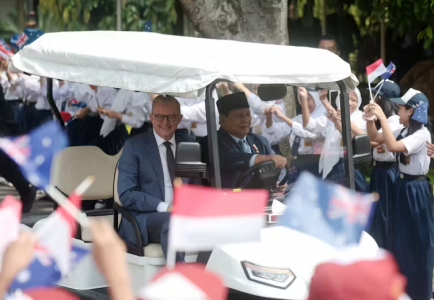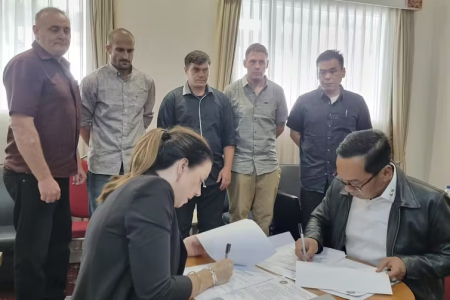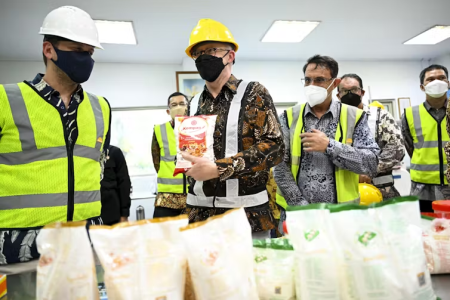There’s no country more important to Australia than Indonesia. Trouble is, the feeling isn’t mutual
- Replies 12
Making Jakarta their first overseas visit has become a set piece for newly elected Australian prime ministers dating back to John Howard in 1996.
So, we should not be surprised that Prime Minister Anthony Albanese flew to Jakarta soon after his landslide re-election, just as he did in 2022. In fact, it would be very surprising if he did not.
These visits are now an obligation for a newly elected PM. Failing to jump on the plane would be seen in Indonesia as an intentional snub.
The visits follow a familiar pattern. The prime minister offers some sort of paraphrase of Paul Keating’s famous tag, “There is no country more important to Australia than Indonesia”. (Albanese actually quoted Keating word for word.)
There is a carefully planned photo op, such as riding bamboo bikes, visiting a crowded marketplace or, this time around, a golf cart ride at the presidential palace.
The brief visit ends with a joint press conference, where both leaders pledge to “strengthen the relationship”. With occasional exceptions, their announcements are vague and aspirational. Sometimes they just restate what they’ve said before.
In other words, these performative post-election prime ministerial visits have become an essential, symbolic part of Australia’s bilateral relationship with Indonesia, but they too often lack substance.
This is a pity, because Australia needs to work much harder to achieve its key aims with Indonesia, which Albanese defined in Jakarta as closer economic and defence engagement.
To put it bluntly, Australia struggles to get Indonesia’s attention. It is an uncomfortable truth that, from an Indonesian perspective, Australia’s leverage and importance is limited. Jakarta sees Canberra as the junior partner in the relationship.
An Indonesian president is hardly likely to say, “There is no country more important to Indonesia than Australia”, let alone make a post-election visit to Canberra a fixture.
In fact, he made a significant friendly gesture to Australia soon after he was sworn in last year by releasing the remaining five members of the Bali Nine from prison in Indonesia and sending them home for Christmas.
This move was beneficial to Prabowo on multiple fronts.
First, generous acts of clemency of this kind distinguish him from his predecessor, Joko “Jokowi” Widodo, and his hardline “war on drugs” policy. Jokowi endorsed Prabowo in last year’s election, but Prabowo is keen to emerge from his long shadow.
Second, Prabowo is far more cosmopolitan and interested in international affairs than his predecessor. He has ambitions to be a player on the global stage, as witnessed by his (failed) efforts to broker a peace between Russia and Ukraine last year. Freeing foreign prisoners makes him more welcome overseas.
Third, granting clemency helps counter Prabowo’s dark past, and the long-standing and credible allegations of human rights abuses that date back to his time as Soeharto’s son-in-law and a special forces commander.
These allegations are more of a problem internationally than at home, but they are still a nuisance for Prabowo. He likely expected his Bali Five gesture would win him a warm and image-enhancing response from Albanese – and indeed, that proved to be the case.
But while all this suited Prabowo nicely, it did not result in any major developments in the two areas most important to Australia: trade and security.
Take security, for example. Indonesia is critically important to Australia as its northern defensive shield. It is vital to our interests that we have a strong security partnership with Indonesia. But Australia is less important to Indonesia’s own defences.
We are also not fully trusted. In addition to lingering concerns about the AUKUS deal with the US and UK, Australia’s role in the independence of Timor–Leste in 1999 resulted in Indonesia famously tearing up the sweeping security treaty Keating negotiated with Soeharto in 1995.
Indeed, the loss of Timor–Leste still rankles with some senior Indonesian military figures. Australia and Indonesia have signed new security arrangements since then – the Lombok Treaty, in particular, and the agreement signed last year enabling more complex training exercises between the two militaries. However, none match the scale of the 1995 agreement.
Moreover, our engagement on security is complicated by Indonesia’s long-standing commitment to a non-aligned diplomatic policy – what it calls “free and active”.
Jakarta did stop short of allowing Russia to base long-range aircraft in Papua province, but under its non-aligned stance, it has purchased weapons and fuel from Russia and become the first Southeast Asian country join the BRICS grouping of countries (founded by Brazil, Russia, India and China).
Indonesia has a population approaching 300 million and a huge retail market. But as a trading partner, Australia ranks far behind many other countries, including China, the US, Japan, India, Singapore, and even Malaysia, the Philippines and Vietnam.
This is despite signing a free trade agreement with Indonesia in 2019. Although it was many years in the making, the deal did not deliver dramatic changes at the time, and has had limited impact ever since.
Indonesia is open about its hunger for more foreign investment. But, again, we are not a major investor in our near neighbour. In fact, Australia invests more in far-flung tax havens such as Luxembourg and Ireland, as well as in Papua New Guinea, Taiwan and India, than we do in Indonesia. It’s not even in our top 20 investment destinations.
As Albanese said in Jakarta, strengthening investment ties requires government, business and civil society demonstrating greater engagement and ambition when it comes to Indonesia.
This is not easy. Australian businesses remain wary of Indonesia because of bureaucratic red tape and the complexity created by decentralised and sometimes chaotic local governments, as well as serious, widespread corruption.
However, this is true of many other business destinations in Asia and the developing world. It is hard to avoid the impression that Australian businesses have a blind spot regarding Indonesia.
Both China and India have large diasporas in Australia that can offer rich human resources for investors in those countries and help them navigate complex markets. By comparison, the local Indonesian population is tiny, and our education system has failed to fill the gap.
In fact, Indonesian studies is barely hanging on by its fingernails in our schools and universities. The numbers of students studying Indonesian in Year 12 has plunged to minuscule numbers in recent years. And universities drop courses every year, with enrolments falling 63% between 1992 and 2019.
A second-term leader with a gigantic majority, Albanese is ideally positioned to do something about this.
He should take a page from the playbooks of ALP heroes Keating and Kevin Rudd, who funded programs to boost Asian languages in schools. Albanese should allocate serious funding – A$100 million would be good start – over the next decade to revive Indonesian language instruction in Australian schools.
That would help rebuild what was once a level of Indonesia literacy unmatched anywhere else in the world. It would be a big step towards helping Australian businesses summon up the courage to enter complex Indonesian markets where only around 5% of the population have functional English.
And it would be an ambitious announcement that would be guaranteed to get serious attention in Jakarta.
This article is republished from The Conversation under a Creative Commons license. Read the original article.
So, we should not be surprised that Prime Minister Anthony Albanese flew to Jakarta soon after his landslide re-election, just as he did in 2022. In fact, it would be very surprising if he did not.
These visits are now an obligation for a newly elected PM. Failing to jump on the plane would be seen in Indonesia as an intentional snub.
The visits follow a familiar pattern. The prime minister offers some sort of paraphrase of Paul Keating’s famous tag, “There is no country more important to Australia than Indonesia”. (Albanese actually quoted Keating word for word.)
There is a carefully planned photo op, such as riding bamboo bikes, visiting a crowded marketplace or, this time around, a golf cart ride at the presidential palace.
The brief visit ends with a joint press conference, where both leaders pledge to “strengthen the relationship”. With occasional exceptions, their announcements are vague and aspirational. Sometimes they just restate what they’ve said before.
In other words, these performative post-election prime ministerial visits have become an essential, symbolic part of Australia’s bilateral relationship with Indonesia, but they too often lack substance.
This is a pity, because Australia needs to work much harder to achieve its key aims with Indonesia, which Albanese defined in Jakarta as closer economic and defence engagement.
To put it bluntly, Australia struggles to get Indonesia’s attention. It is an uncomfortable truth that, from an Indonesian perspective, Australia’s leverage and importance is limited. Jakarta sees Canberra as the junior partner in the relationship.
An Indonesian president is hardly likely to say, “There is no country more important to Indonesia than Australia”, let alone make a post-election visit to Canberra a fixture.
Prabowo’s gesture to Australia
This is not to say Indonesia’s current president, Prabowo Subianto, is hostile to Australia. He is not.In fact, he made a significant friendly gesture to Australia soon after he was sworn in last year by releasing the remaining five members of the Bali Nine from prison in Indonesia and sending them home for Christmas.
This move was beneficial to Prabowo on multiple fronts.
First, generous acts of clemency of this kind distinguish him from his predecessor, Joko “Jokowi” Widodo, and his hardline “war on drugs” policy. Jokowi endorsed Prabowo in last year’s election, but Prabowo is keen to emerge from his long shadow.
Third, granting clemency helps counter Prabowo’s dark past, and the long-standing and credible allegations of human rights abuses that date back to his time as Soeharto’s son-in-law and a special forces commander.
These allegations are more of a problem internationally than at home, but they are still a nuisance for Prabowo. He likely expected his Bali Five gesture would win him a warm and image-enhancing response from Albanese – and indeed, that proved to be the case.
But while all this suited Prabowo nicely, it did not result in any major developments in the two areas most important to Australia: trade and security.
Lingering mistrust on security matters
There are understandable reasons for this.Take security, for example. Indonesia is critically important to Australia as its northern defensive shield. It is vital to our interests that we have a strong security partnership with Indonesia. But Australia is less important to Indonesia’s own defences.
We are also not fully trusted. In addition to lingering concerns about the AUKUS deal with the US and UK, Australia’s role in the independence of Timor–Leste in 1999 resulted in Indonesia famously tearing up the sweeping security treaty Keating negotiated with Soeharto in 1995.
Indeed, the loss of Timor–Leste still rankles with some senior Indonesian military figures. Australia and Indonesia have signed new security arrangements since then – the Lombok Treaty, in particular, and the agreement signed last year enabling more complex training exercises between the two militaries. However, none match the scale of the 1995 agreement.
Moreover, our engagement on security is complicated by Indonesia’s long-standing commitment to a non-aligned diplomatic policy – what it calls “free and active”.
Jakarta did stop short of allowing Russia to base long-range aircraft in Papua province, but under its non-aligned stance, it has purchased weapons and fuel from Russia and become the first Southeast Asian country join the BRICS grouping of countries (founded by Brazil, Russia, India and China).
Undercooked on trade and investment
As for the economic relationship, our low profile in Indonesian markets – despite our proximity – severely limits our leverage and influence in Indonesia.Indonesia has a population approaching 300 million and a huge retail market. But as a trading partner, Australia ranks far behind many other countries, including China, the US, Japan, India, Singapore, and even Malaysia, the Philippines and Vietnam.
This is despite signing a free trade agreement with Indonesia in 2019. Although it was many years in the making, the deal did not deliver dramatic changes at the time, and has had limited impact ever since.
Indonesia is open about its hunger for more foreign investment. But, again, we are not a major investor in our near neighbour. In fact, Australia invests more in far-flung tax havens such as Luxembourg and Ireland, as well as in Papua New Guinea, Taiwan and India, than we do in Indonesia. It’s not even in our top 20 investment destinations.
As Albanese said in Jakarta, strengthening investment ties requires government, business and civil society demonstrating greater engagement and ambition when it comes to Indonesia.
This is not easy. Australian businesses remain wary of Indonesia because of bureaucratic red tape and the complexity created by decentralised and sometimes chaotic local governments, as well as serious, widespread corruption.
However, this is true of many other business destinations in Asia and the developing world. It is hard to avoid the impression that Australian businesses have a blind spot regarding Indonesia.
A move that would get Jakarta’s attention
The ambition that Albanese called for is well overdue.Both China and India have large diasporas in Australia that can offer rich human resources for investors in those countries and help them navigate complex markets. By comparison, the local Indonesian population is tiny, and our education system has failed to fill the gap.
In fact, Indonesian studies is barely hanging on by its fingernails in our schools and universities. The numbers of students studying Indonesian in Year 12 has plunged to minuscule numbers in recent years. And universities drop courses every year, with enrolments falling 63% between 1992 and 2019.
A second-term leader with a gigantic majority, Albanese is ideally positioned to do something about this.
He should take a page from the playbooks of ALP heroes Keating and Kevin Rudd, who funded programs to boost Asian languages in schools. Albanese should allocate serious funding – A$100 million would be good start – over the next decade to revive Indonesian language instruction in Australian schools.
That would help rebuild what was once a level of Indonesia literacy unmatched anywhere else in the world. It would be a big step towards helping Australian businesses summon up the courage to enter complex Indonesian markets where only around 5% of the population have functional English.
And it would be an ambitious announcement that would be guaranteed to get serious attention in Jakarta.
This article is republished from The Conversation under a Creative Commons license. Read the original article.










